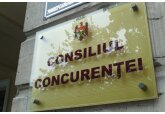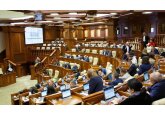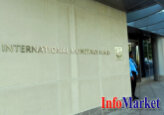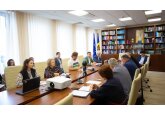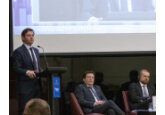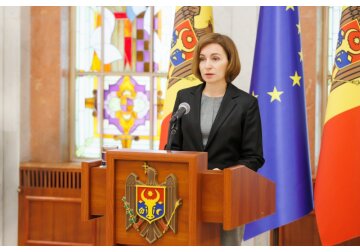
The Supreme Security Council of Moldova has recommended that the government check the degree of preparedness of institutions and the population for the possible consequences of nuclear incidents.
Moldovan President Maia Sandu stated this at a Monday press conference on the decisions taken by the Supreme Security Council (CSS). She specified that the risk of the use of nuclear weapons is currently assessed as unlikely, but possible. The Moldovan head of state noted that at a meeting of the Supreme Security Council on Saturday, responsible institutions reported on changes that might occur in the region, and Moldova in particular, as a result of Russia's declarations of partial mobilization, separatist referendums in Ukrainian regions controlled by the Russian army, and the possible use of nuclear weapons. In particular, members of the CSS discussed the possible consequences of an escalation of the military conflict in Ukraine, including the risks of nuclear incidents. The speakers mentioned several categories of risks: increased refugee flows, interruption of natural gas supplies, electricity supply disruptions, and the use of the crisis by criminal groups and foreign agents to provoke destabilization. Maia Sandu stressed that the CSS approved the following recommendations: to be more vigilant and to update the action plans in line with the new risks; to monitor more strictly the situation in the Transnistrian region and to avoid the involvement of the local population in the Russian mobilization actions; to prepare for a possible increase in the flow of refugees; to supply alternative energy resources in emergency cases; to check the action plans in case of nuclear incidents. President of the Republic of Moldova noted that, at present, the risk of the use of nuclear weapons is assessed as unlikely, but not impossible. In this context, the government was advised to check the degree of preparedness of institutions and the population for the possible consequences of nuclear incidents and to renew the information campaign on protection measures in case of a nuclear accident. The head of state urged citizens to pay attention to reports of the General Inspectorate for Emergency Situations in this regard. Maia Sandu stressed that there is a risk of mobilization of Moldovan citizens from the eastern parts of the country. "In order to prevent such actions, we are analyzing the possibility of depriving Moldovan citizens who will fight on the side of the aggressor of Moldovan and Russian citizenship. Similarly, we are considering the possibility of toughening penalties for those who have only Moldovan citizenship, but do not have Russian citizenship, and have gone over to the side of the aggressor," President said. According to Maia Sandu, the CSS asked the Ministry of Foreign Affairs and European Integration (MFAEI) to initiate bilateral consultations with Russia in order to exclude cases of recruitment of Moldovan citizens residing in Russia as part of the ongoing mobilization activities. In addition, the MFAEI and other institutions will take measures to support Moldovan citizens wishing to return home from Russia. The embassy is already working overtime to meet the growing needs. The head of state also pointed out that security incidents have recently increased. "Citizens are subjected to controls that do not meet the standards of peacekeeping missions. Our representatives on the Joint Control Commission are seeking explanations and working to de-escalate the situation. Obviously, security risks are increasing. This means that we need to strengthen defense, security and policing. All institutions in these sectors are mobilized to respond adequately to these risks," Maia Sandu said. // 26.09.2022 - InfoMarket.


